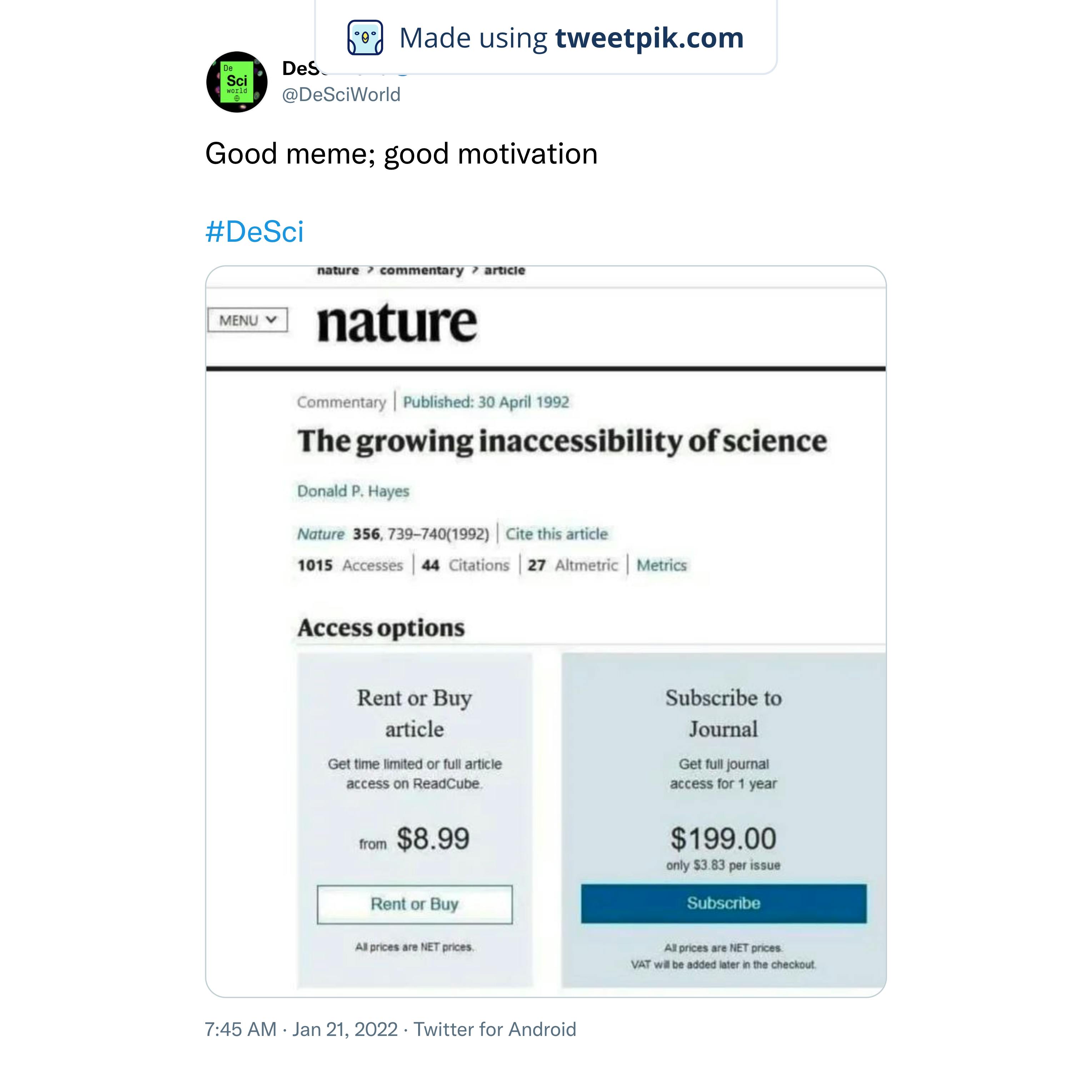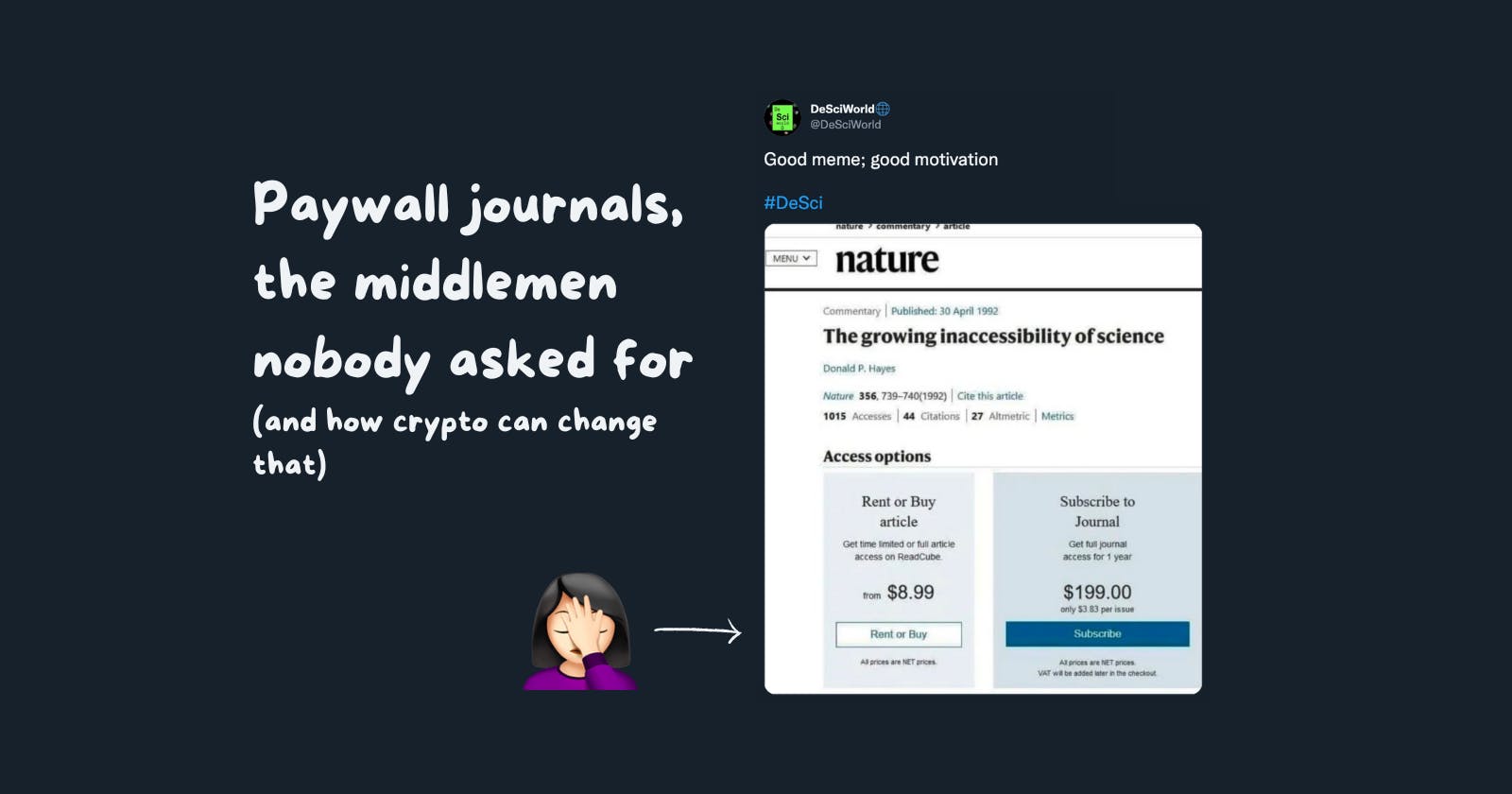Paywall journals prevent progress.
Here are two reasons why:
1/ Expensive subscription fees which limit access to information.
I'm not talking about $20/month Netflix subscriptions.
No, think bigger, way bigger.
They actually range from thousands to millions per year.
 (when boomer media tries to be relevant but is super cringe)
(when boomer media tries to be relevant but is super cringe)
This is why you need to be part of a university or research institution who can pay the subscription fees.
(unless you're a resourceful pirate arggg).
But wait there's more.
Scientists pay an extra fee (~$2-10K) to have their research paper be open-access (free to the public).

Yep. Crazy.
2/ Slow peer-review process that lacks transparency.
It can take months and sometimes years to publish a peer-reviewed paper.
It took me 2+ years to publish one of my research papers. I almost gave up. But to paraphrase 50 cent "get published or die trying" right?
Why is it so slow?
Part of the reason is because the reviewing a paper is voluntary.
The journals look for 2-3 reviewers (other scientists) who are willing to do the work for... free.
(It's a pay-it-forward kinda economy except most of the value created ends up going to the journal)
The peer review process also lacks transparency making it prone to bias and abuse:
- Most times, the reviewers' identities are not revealed to the authors
- The reviews are secret where only the journal editors, reviewers, and authors get to see them
This means reviewers have no skin the game and there is no benefit or drawback to their review decisions.
So what is decentralised science (DeSci) and how can it improve science?
DeSci is a movement to improve science, using web3 tech and tools.
Wait, what's web3?
Like you, I didn't even know we have gone past web1 when I learnt about web3.
(Jack Dorsey, founder of Twitter is already working on web5, because 2 + 3 = 5 and we like the fibonacci)
First, here's a quick explanation of web1 and web2.
Web1 was only static pages. Wow yellow pages on the internet?!
Web2 is the current version of the internet we use today. It's interactive and personalised but centralised.
This is also where middlemen (e.g. paywall journals) thrive because they bridge the trust gap between strangers.
For example, would you rather buy the same item from a seller on eBay or gumtree, if you can't pick it up locally?
You'd pick eBay right?
Because we both know that eBay will give us back our money if anything goes wrong.
This is why selling on eBay is expensive because they charge a high fee for being a trust bridge.
Likewise, paywall journals are the middleman of the peer review process.
They are supposed to help us trust the science.
(btw, that phrase is so overused it feels like it's lost its meaning)
And here's where web3 and DeSci can disrupt the traditional publishing model.
With the help of web3 tech, we don't need human middlemen anymore.
The middleman is code.
Code is emotionless and doesn't need to earn money to feed its family.
Blockchain is the underlying tech that runs web3.
But all you need to know is that web3 enables trust, transparency and universal access.
This means you can verify and track records, and do not need to ask for permission to use a product or service.
Web3 allows us to develop new ways of publishing.
Some cool examples that will get you nerds excited:
- Research papers and reviews are published on-chain (open & decentralised database). This increases access, transparency and collaboration
- Scientists own their intellectual property (IP) and are free to distribute it in a transparent manner. This creates new and more efficient ways of fundraising
- Author contributions are accurately tracked and verified
- You can earn tokens and reputation for peer-reviewing work. Get paid?! Poor PhD students rejoice!
DeSci can also improve how we fund science and how collaboration can happen.
I'll be exploring all that in future posts so subscribe to my free newsletter so you don't miss out!
And that's all folks, hope you enjoyed the first post of my DeSci series!
What did you think of this post? Reply 🐒 = lame. 🐒🐒🐒 = meh. 🐒🐒🐒🐒🐒 = enjoyed it!
Sauces
- The title of this post was quoted from the interview with Brian Armstrong on the Lex Friedman Podcast!
- Crypto Sci-Hub and the Decentralization of Science
- Ideas on how to improve scientific research
ps. I appreciate all feedback!

